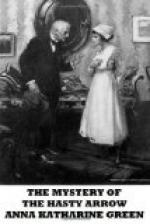Meantime the detective studied his countenance. It was a good one, but just now so distorted by suffering that only such as were familiar with his every look could read his character from his present expression. Would a more direct question rouse him? Possibly. At all events, Mr. Gryce decided to make the experiment.
“Will you give me your name?” he asked, “—your name and residence?”
The man he addressed gave a quick start, pulled himself together and made an attempt to reply.
“My name is Travis. I am an Englishman just off the steamer from Southampton. My home is in the county of Hertfordshire. I have no residence here.”
“Your hotel, then?”
Another flush—then quickly: “I have not yet chosen one.”
This was too surprising for belief. A stranger in town without rooms or hotel accommodations, making use of the morning hours to visit a museum!
“You must be very much interested in art!” observed his inquisitor a little dryly.
Again that flush and again the quick-recurring pallor.
“I—I am interested in all things beautiful,” he replied at last in broken tones.
“I see. May I ask where you were when that arrow flew which killed a young lady visitor? Not in this part of the court, I take it?”
Mr. Travis gave a quick shudder and that was all. The detective waited, but no other answer came.
“I am told that as she fell she uttered one cry. Did you hear it, Mr. Travis?”
“It wasn’t a cry,” was his quick reply. “It was something quite different, but dreadful, dreadful!”
Mr. Gryce’s manner changed.
“Then you did hear it. You were near enough to distinguish between a scream and a gasp. Where were you, and why weren’t you seen by my man when he went through the building?”
“I—I was kneeling out of sight—too shocked to move. But I grew tired of that and wanted to go; but on reaching the court, I found the doors closed. So I came here.”
“Kneeling! Where were you kneeling?”
He made a quick gesture in the direction of the galleries.
The detective frowned, perhaps to hide his secret satisfaction.
“Won’t you be a little more definite?” he asked; then as the man continued to hesitate he added, but as yet without any appreciable loss of kindliness: “Every other person here has been good enough to show us the exact place he was occupying at that serious moment. I must ask you to do the same; it is only just.”
Was the look this called up one of fear or of simple repugnance? It might be either; but the detective was disposed to consider it fear.
“Will you lead the way?” he pursued. “I shall be glad to follow.”
A glance of extreme reproach; then these words, uttered with painful intensity:
“You want me to go back there—where I saw—where I can see again—I cannot. I’m not well. I suffer. You will excuse me. You will allow me to say what I have to say, here.”




